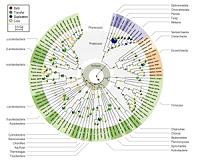| . |  |
. |
Madrid, Spain (SPX) Jan 31, 2011 We have developed an 'anytime' intelligence test, in other words a test that can be interrupted at any time, but that gives a more accurate idea of the intelligence of the test subject if there is a longer time available in which to carry it out", Jose Hernandez-Orallo, a researcher at the Polytechnic University of Valencia (UPV), tells SINC. This is just one of the many determining factors of the universal intelligence test. "The others are that it can be applied to any subject - whether biological or not - at any point in its development (child or adult, for example), for any system now or in the future, and with any level of intelligence or speed", points out Hernandez-Orallo. The researcher, along with his colleague David L. Dowe of the Monash University, Clayton (Australia), have suggested the use of mathematical and computational concepts in order to encompass all these conditions. The study has been published in the journal Artificial Intelligence and forms part of the "Anytime Universal Intelligence" project, in which other scientists from the UPV and the Complutense University of Madrid are taking part. The authors have used interactive exercises in settings with a difficulty level estimated by calculating the so-called 'Kolmogorov complexity' (they measure the number of computational resources needed to describe an object or a piece of information). This makes them different from traditional psychometric tests and artificial intelligence tests (Turing test).
Use in artificial intelligence And what is even "more important" is that there were no theories or tools to evaluate and compare future intelligent systems that could demonstrate intelligence greater than human intelligence. The implications of a universal intelligence test also impact on many other disciplines. This could have a significant impact on most cognitive sciences, since any discipline depends largely on the specific techniques and systems used in it and the mathematical basis that underpins it. "The universal and unified evaluation of intelligence, be it human , non-human animal, artificial or extraterrestrial, has not been approached from a scientific viewpoint before, and this is a first step", the researcher concludes.
Share This Article With Planet Earth
Related Links FECYT - Spanish Foundation for Science and Technology Darwin Today At TerraDaily.com
 High School Biology Teachers Reluctant To Endorse Evolution In Class
High School Biology Teachers Reluctant To Endorse Evolution In ClassUniversity Park PA (SPX) Jan 31, 2011 The majority of public high school biology teachers are not strong classroom advocates of evolutionary biology, despite 40 years of court cases that have ruled teaching creationism or intelligent design violates the Constitution, according to Penn State political scientists. A mandatory undergraduate course in evolutionary biology for prospective teachers, and frequent refresher courses for curr ... read more |
|
| The content herein, unless otherwise known to be public domain, are Copyright 1995-2010 - SpaceDaily. AFP and UPI Wire Stories are copyright Agence France-Presse and United Press International. ESA Portal Reports are copyright European Space Agency. All NASA sourced material is public domain. Additional copyrights may apply in whole or part to other bona fide parties. Advertising does not imply endorsement,agreement or approval of any opinions, statements or information provided by SpaceDaily on any Web page published or hosted by SpaceDaily. Privacy Statement |